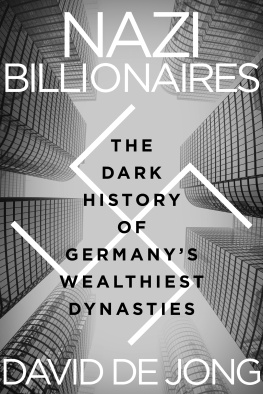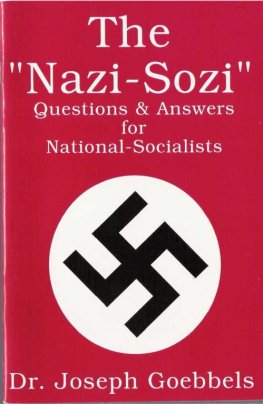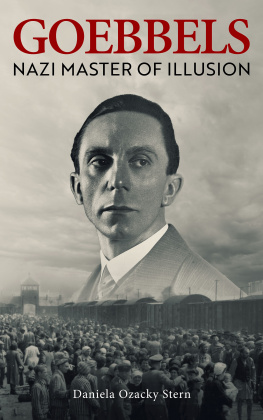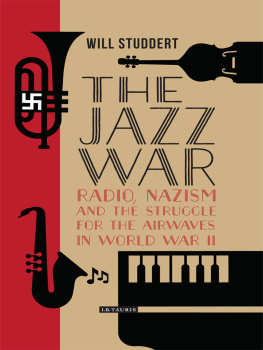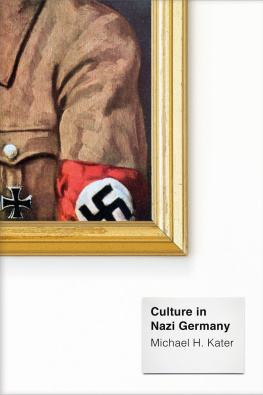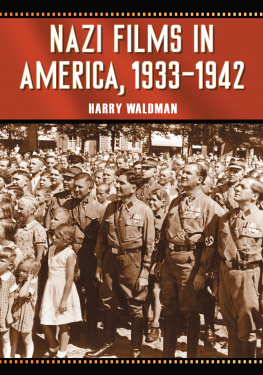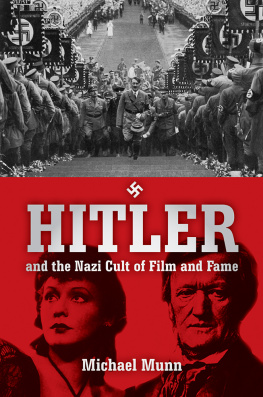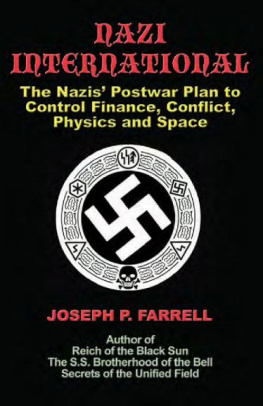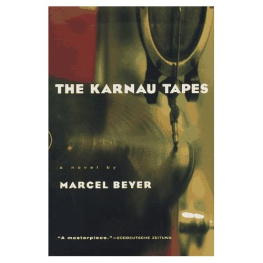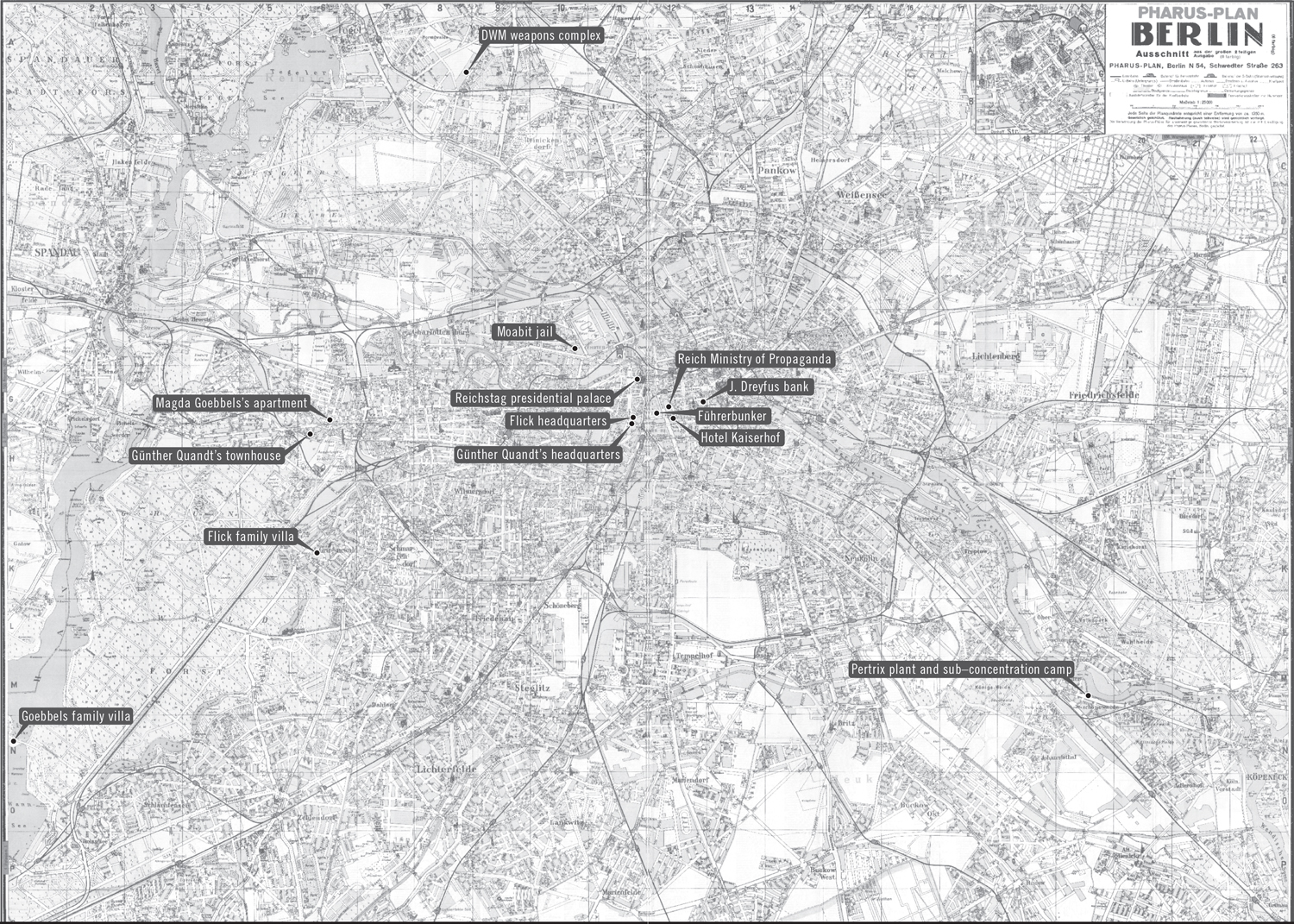They have plundered the world, stripping naked the land in their hunger... They are driven by greed, if their enemy be rich; by ambition, if poor... They ravage, they seize by false pretenses, and all of this they hail as the construction of empire. And when in their wake nothing remains but a desert, they call that peace.
THE QUANDTS
Gnther Quandt: Patriarch. Industrialist.
Horst Pavel: Gnthers right-hand man.
Toni Quandt: Gnthers first wife. Herberts mother.
Magda Goebbels: Gnthers second wife. Haralds mother.
Ello Quandt: Gnthers sister-in-law. Magdas best friend. Haralds godmother.
Harald Quandt: Only child from Magda and Gnthers marriage.
Gabriele Quandt: Haralds daughter.
Herbert Quandt: Gnthers eldest son. BMWs savior.
Susanne Klatten: Herberts youngest daughter. BMW heiress.
Stefan Quandt: Herberts youngest son. BMW heir.
THE FLICKS
Friedrich Flick: Patriarch. Industrialist.
Otto Steinbrinck: Friedrichs right-hand man.
Otto-Ernst Flick: Friedrichs eldest son.
Muck, Mick, and Dagmar Flick: Otto-Ernsts children.
Friedrich Karl Flick: Friedrichs youngest son.
Eberhard von Brauchitsch: Friedrich Karls best friend.
Ingrid Flick: Friedrich Karls widow.
THE VON FINCKS
August von Finck Sr.: Patriarch. Private banker.
Kurt Schmitt: Allianz CEO. Reich minister of economic affairs.
August Gustl von Finck Jr.: Investor.
Ernst Knut Stahl: Gustls right-hand man.
THE PORSCHE-PICHS
Ferdinand Porsche: Patriarch. Creator of Volkswagen and Porsche.
Anton Pich: Ferdinands son-in-law. Married to Louise.
Ferry Porsche: Ferdinands son. SS officer.
Louise Pich: Ferdinands daughter. Married to Anton.
THE OETKERS
Richard Kaselowsky: Patriarch. CEO of Dr. Oetker.
Rudolf-August Oetker: Kaselowskys stepson. Waffen-SS officer.
Rudolf von Ribbentrop: Rudolf-Augusts best friend. Waffen-SS officer.
THE TOP NAZIS
Adolf Hitler: The fhrer.
Joseph Goebbels: Reich minister of propaganda. Magdas spouse. Haralds stepfather.
Hermann Gring: Reichsmarschall. Main decision maker in Nazi economic policy.
Heinrich Himmler: Reichsfhrer SS. Principal organizer of the Holocaust.
Hjalmar Schacht: Reichsbank president and Reich minister of economic affairs.
Walther Funk: Reich minister of economic affairs and Reichsbank president.
Otto Wagener: Hitlers economic adviser.
Wilhelm Keppler: Hitlers economic adviser. Kranefusss uncle.
Fritz Kranefuss: Organizer of Himmlers Circle of Friends. Kepplers nephew.
THE PERSECUTED
Adolf Rosenberger: Cofounder of Porsche.
Johanna and Fritz Heine: Business owners.
Hahn family: Business owners.
Heirs of Julius and Ignaz Petschek: Business owners.
Willy Dreyfus: Private banker.
Louis von Rothschild: Private banker.
THE AMERICANS
Telford Taylor: Chief prosecutor of the Nuremberg Military Tribunals.
John J. McCloy: US high commissioner for occupied Germany.
THE REIMANNS
Albert Reimann: Patriarch. CEO of Joh. A. Benckiser (JAB).
Peter Harf: Chairman of JAB. Family confidant.
Wolfgang Reimann: Alberts eldest son.
And there they stand, affectless, like twenty-four calculating machines at the gates of Hell.
ric Vuillard, The Order of the Day
The invitations, sent by telegram four days earlier, left no doubt. The capital was calling. On Monday, February 20, 1933, at 6 p.m., about two dozen of Nazi Germanys wealthiest and most influential businessmen arrived, on foot or by chauffeured car, to attend a meeting at the official residence of the Reichstag president, Hermann Gring, in the heart of Berlins government and business district. The attendees included Gnther Quandt, a textile producer turned arms-and-battery tycoon; Friedrich Flick, a steel magnate; Baron August von Finck, a Bavarian finance mogul; Kurt Schmitt, CEO of the insurance behemoth Allianz; executives from the chemicals conglomerate IG Farben and the potash giant Wintershall; and Gustav Krupp von Bohlen und Halbach, chairman-through-marriage of the Krupp steel empire.
Three weeks earlier, Adolf Hitler had seized power in Germany after concluding a backroom deal that led the Reich president, Paul von Hindenburg, to appoint Hitler as chancellor. Now the leader of the Nazi Party wanted to explain his policies to the group of industrialists, financiers, executives, and heirs, or at least thats what hed led them to believe. The businessmen were hoping for reassurance concerning the direction of Germanys economy under this new government. They would not get it. Hitler had his own plans for the meeting, and the country.
The businessmen arrived on time at Grings palatial sand-red residence on the south bank of Berlins Spree River, next door to the Reichstag. But they were kept waiting not something that the impatient tycoons were particularly used to or fond of. Gring, their host, didnt greet them until fifteen minutes after the scheduled start time. In tow was Walther Funk, the dumpy and balding chief press officer for Hitlers government. The new chancellor arrived even later, accompanied by Otto Wagener, his main economic adviser. The master of ceremonies was Hjalmar Schacht, formerly president of the Reichsbank, Germanys central bank. (As it turned out, Funk, Schacht, Gring, and Allianz CEO Schmitt, four of Hitlers future ministers of economic affairs, were all present.) The meeting was the culmination of years of careful groundwork laid by Hitlers officials years of cultivating relationships with the tycoons to build up enthusiasm for the Nazi cause.
After shaking hands with the businessmen, Hitler launched into a rambling ninety-minute speech, delivered without notes or pauses. But instead of the policy talk that had been promised, Hitler gave a sweeping diagnosis of the current political moment. The year 1918 had been a catastrophic turning point in German history, with the defeat of the German Empire in World War I and the revolution in Russia, during which the Communists came to power. In Hitlers eyes, the time had come to settle the struggle between the right and the left once and for all.
Hitler argued that, in supporting his rise as fhrer, the moguls would in effect be supporting themselves, their firms, and their fortunes. Private enterprise cannot be maintained in the age of democracy, the forty-three-year-old chancellor said. It is conceivable only if the people have a sound idea of authority and personality. Everything positive, good and valuable, which has been achieved in the world in the field of economics and culture, is solely attributable to the importance of personality. Hitler didnt speak about abolishing labor unions, rearmament, war, or the removal of Jews from German life. But he did provide a glimpse of what was to come: We must first gain complete power if we want to crush the other side completely.
Near the end of his speech, Hitler laid out how that would happen. In only two weeks, on March 5, 1933, the people of Germany would determine the countrys future by casting their votes in the national election the last election, according to Hitler. One way or another, democracy would fall. Germanys new chancellor intended to dissolve it entirely and replace it with a dictatorship. Regardless of the outcome, he warned, there would be no retreat... There are only two possibilities, either to crowd back the opponent on constitutional grounds... or a struggle will be conducted with other weapons, which may demand greater sacrifices. If the election didnt bring Hitlers party into control, a civil war between the right and the left would certainly erupt, he intimated. Hitler waxed poetic: I hope the German people recognize the greatness of the hour. It shall decide the next ten or probably even hundred years.

